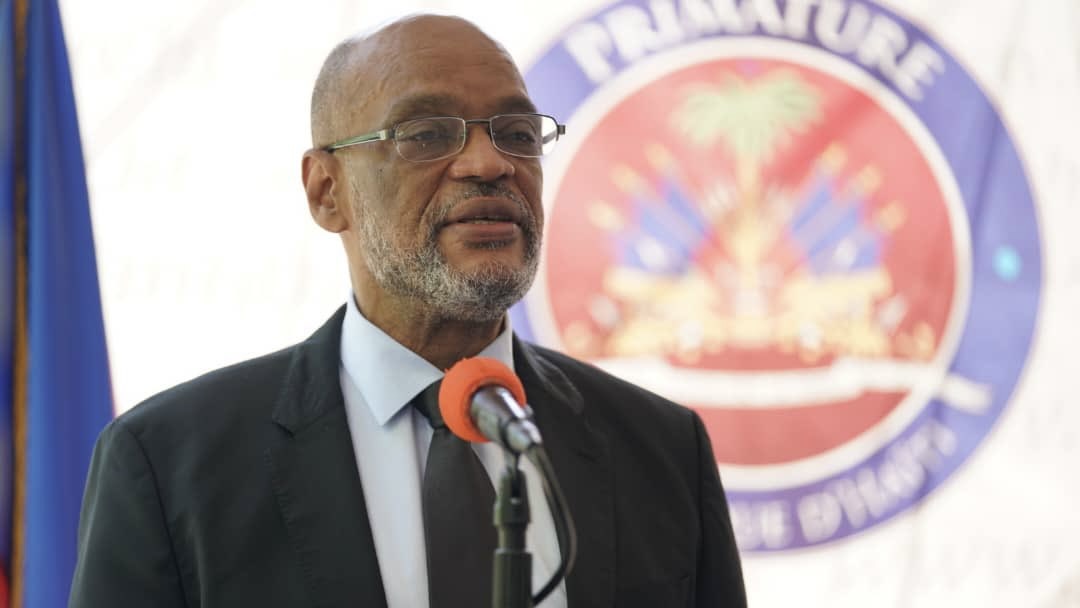The political turmoil in Haiti has further deepened as acting Prime Minister and President Ariel Henry comes under suspicion in the assassination of de-facto President Jovenel Moïse. In the past two days, the country has witnessed major changes in the government and the judiciary amid new allegations.
On September 14, the country’s chief prosecutor, Bed-Ford Claude, asked the Port-au-Prince’s First Instance Court to investigate Henry in relation to Moïse’s murder. In an official request addressed to Judge Garry Orélien, Claude claimed Henry had spoken on the phone twice with one of the alleged masterminds of the crime, Joseph Felix Badio, hours after Moïse was shot dead at his residence on the night of July 7.
Last week, Claude reported that according to the phone records of two numbers, supposedly belonging to Henry and Badio, the two had communicated for about eight minutes within a few hours after Moïse’s murder. He also reported that according to location data provided by the telephone company, at the time of the calls, Henry was at Hotel Montana in Port-au-Prince, while Badio was somewhere near Moïse’s house. The former justice ministry official Badio has not yet been apprehended and his current whereabouts are unknown.
In this regard, the prosecutor summoned Henry to testify on the content of those calls on September 14. However, the acting head of state publically disqualified the call.
“No distraction, summons, invitation, maneuver, threat, underhanded attack, or aggression, will distract me from my mission. Actions to create confusion and prevent justice from being done cannot occur. The real culprits, the intellectual authors and those responsible for the assassination of President Jovenel Moïse, will be tried and punished for their actions,” said Henry on September 11, during the signing of an agreement on transitional government with the opposition.
This Tuesday, the interim head of state didn’t attend the hearing, as without an authorization for investigation from the president, the prime minister is not obliged to respond to justice. In the present case, Judge Orélien, who is investigating the case, is the only competent authority to call witnesses or defendants to testify or to decide who is a suspect in the crime.
In response, Claude asked the examining magistrate to charge him in connection with the crime. “There are enough compromising elements to prosecute Henry and ask for his outright indictment,” stated Claude in the request letter.
The same day, he also sent a letter to the Directorate of Immigration and Emigration, asking the authorities to prevent Henry from leaving the country due to the “gravity” of the facts that had emerged.
Henry did not respond to the allegations regarding the phone calls. However, hours later, amid disagreements over his alleged links with a suspect of the assassination, the PM dismissed Claude due to “serious administrative misconduct.” Henry made the decision public by releasing a letter dated September 13, but without detailing the infractions committed by Claude.
A day after Claude’s removal, on September 15, the secretary of the Council of Ministers, Renald Lubérice, resigned from his position, which held for more than four years, citing the prosecutor’s accusations. In his resignation letter sent to the Council of Ministers, Lubérice said that he cannot continue in office under the direction of a person implicated in the president’s murder.
“I would not know how to be under the direction of a person named by Jovenel Moïse, accused of his murder, who has no intention of cooperating with justice and seeks, on the contrary, by all means, to obstruct it,” Lubérice wrote.
Some Haitian media reported that Henry dismissed Lubérice and also the Minister of Justice, Rockefeller Vincent, the day he dismissed Claude, but this information has not been officially confirmed.
Political crisis in Haiti
Since the beginning of this year, Haiti has been going through a delicate political situation. Up until Moïse’s assassination, Haitians had been mobilizing on the streets against his illegitimate rule. Moïse’s term had constitutionally ended on February 7, but he refused to step down and remained in office. Additionally, he had been governing by a decree with a non-functional parliament since January 2020 because his administration failed to hold legislative elections amid a wave of anti-government protests. However, his assassination pushed the country into an unprecedented constitutional and political crisis as the current constitution doesn’t provide for a provision with regards to how to replace an assassinated president.
Moïse had replaced prime minister Claude Joseph with the-then interior minister Henry just two days before his assassination. However, Henry assumed the responsibility on July 19, over a week after Joseph’s initial self-proclaimed rule. Nevertheless, Haitian social movements do not recognize Henry’s mandate as legal.
This new crisis has occurred at a time when there are two major political proposals to resolve the multiple crises facing the country. The proposal promoted by Henry and signed with some opposition forces this weekend, foresees the establishment of a transitional government under his rule until presidential and legislative elections and a constitutional referendum are held next year. It also establishes the creation of a constituent assembly to draft a new constitution, among other measures.
The second, proposed by the Commission to Search a Solution to the Crisis (CRSC), a platform that brings together more than 500 social organizations and progressive political movements, encourages the inauguration of a new interim president by a new national council, made of about 50 people from diverse forces of the country.





